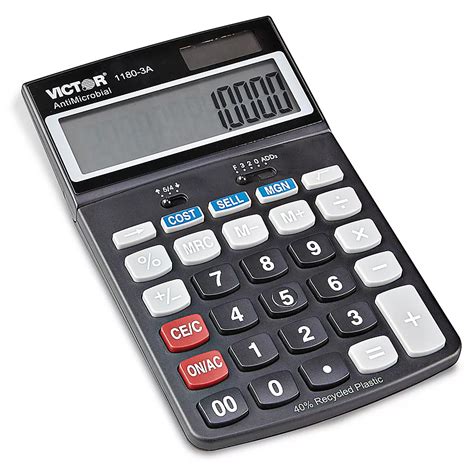A four-function calculator is a basic electronic device designed to perform the four basic arithmetic operations: addition, subtraction, multiplication, and division. These calculators are widely used in both educational and professional settings and are often the first type of calculator introduced to students.

Types of Four Function Calculators
Four function calculators come in various types, including:
- Desktop calculators: These are the most common type of four-function calculator. They are typically larger in size and have a display screen that shows the numbers and calculations.
- Pocket calculators: These calculators are smaller and more portable than desktop calculators. They are designed to fit in a pocket or purse and have a more compact display screen.
- Solar-powered calculators: These calculators are powered by solar energy and do not require batteries. They are environmentally friendly and can be used in low-light conditions.
Features of Four Function Calculators
Four function calculators typically have a number of features, including:
- Basic arithmetic operations: Addition, subtraction, multiplication, and division
- Percentage calculation: Calculating percentages and discounts
- Memory function: Storing values for later use
- Clear function: Deleting numbers and calculations
- Backspace function: Deleting individual digits
- Decimal point: Representing decimal values
Applications of Four Function Calculators
Four function calculators are used in a wide range of applications, including:
Educational Settings:
* Helping students learn basic arithmetic operations
* Reinforcing mathematical concepts
* Assessing student progress
Professional Settings:
* Performing calculations in finance, accounting, and sales
* Estimating costs, expenses, and profits
* Calculating measurements and conversions
Everyday Use:
* Calculating shopping bills
* Estimating gas mileage
* Managing personal finances
Benefits of Using a Four Function Calculator
Accuracy and Efficiency:
* Calculators eliminate the risk of human error and speed up calculations.
* They provide instant and accurate results, freeing up time for other tasks.
Accessibility:
* Calculators are widely available and affordable, making them accessible to anyone.
* They are especially useful for individuals with learning disabilities or cognitive impairments.
Portability:
* Pocket calculators are small and lightweight, making them easy to carry and use anywhere.
* This convenience allows for quick calculations on the go.
Environmental Considerations:
* Solar-powered calculators reduce the need for batteries, minimizing environmental impact.
Challenges in Using a Four Function Calculator
Limited Functionality:
* Four function calculators are limited to performing basic arithmetic operations and do not offer advanced features like scientific or graphing capabilities.
* For more complex calculations, a more advanced calculator is required.
Input Errors:
* It is important to enter numbers and calculations correctly to obtain accurate results.
* Input errors can lead to incorrect calculations.
Tips for Using a Four Function Calculator
- Use the memory function to store values for later use, reducing the need to re-enter numbers.
- Double-check your inputs to avoid errors, especially when performing complex calculations.
- Use a solar-powered calculator to minimize battery usage and environmental impact.
- Keep your calculator clean and in good working order to ensure accurate results.
Pros and Cons of Using a Four Function Calculator
Pros:
- Simplicity: Easy to use and understand
- Accuracy: Provides fast and accurate calculations
- Affordability: Widely available at a low cost
- Portability: Pocket calculators can be carried anywhere
Cons:
- Limited Functionality: Does not offer advanced features
- Input Errors: Requires careful attention to prevent errors
- Short Lifespan: Battery-powered calculators may have a limited lifespan
Conclusion
Four function calculators are versatile and indispensable tools for performing basic arithmetic operations in various settings. They offer accuracy, efficiency, and portability, making them a valuable asset for students, professionals, and individuals in everyday life. By understanding the features, benefits, and limitations of four function calculators, users can maximize their utility and avoid potential challenges.
